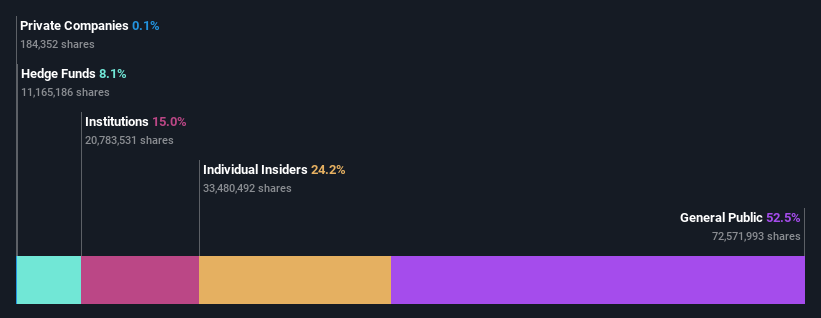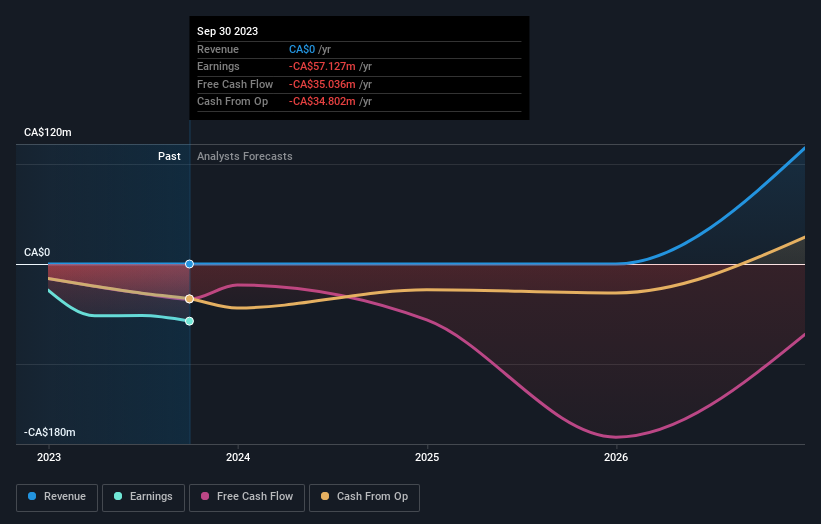- Canada
- /
- Metals and Mining
- /
- TSXV:LTH
Lithium Ionic Corp.'s (CVE:LTH) market cap up CA$17m last week, benefiting both retail investors who own 53% as well as insiders

Key Insights
- Lithium Ionic's significant retail investors ownership suggests that the key decisions are influenced by shareholders from the larger public
- A total of 25 investors have a majority stake in the company with 47% ownership
- Insiders have bought recently
To get a sense of who is truly in control of Lithium Ionic Corp. (CVE:LTH), it is important to understand the ownership structure of the business. And the group that holds the biggest piece of the pie are retail investors with 53% ownership. Put another way, the group faces the maximum upside potential (or downside risk).
Following a 13% increase in the stock price last week, retail investors profited the most, but insiders who own 24% stock also stood to gain from the increase.
In the chart below, we zoom in on the different ownership groups of Lithium Ionic.
View our latest analysis for Lithium Ionic

What Does The Institutional Ownership Tell Us About Lithium Ionic?
Many institutions measure their performance against an index that approximates the local market. So they usually pay more attention to companies that are included in major indices.
As you can see, institutional investors have a fair amount of stake in Lithium Ionic. This implies the analysts working for those institutions have looked at the stock and they like it. But just like anyone else, they could be wrong. If multiple institutions change their view on a stock at the same time, you could see the share price drop fast. It's therefore worth looking at Lithium Ionic's earnings history below. Of course, the future is what really matters.

It would appear that 8.1% of Lithium Ionic shares are controlled by hedge funds. That catches my attention because hedge funds sometimes try to influence management, or bring about changes that will create near term value for shareholders. Waratah Capital Advisors Ltd. is currently the company's largest shareholder with 8.1% of shares outstanding. Scotia Asset Management L.P. is the second largest shareholder owning 7.2% of common stock, and Helio Diniz holds about 6.2% of the company stock. Helio Diniz, who is the third-largest shareholder, also happens to hold the title of Member of the Board of Directors.
A deeper look at our ownership data shows that the top 25 shareholders collectively hold less than half of the register, suggesting a large group of small holders where no single shareholder has a majority.
While studying institutional ownership for a company can add value to your research, it is also a good practice to research analyst recommendations to get a deeper understand of a stock's expected performance. Quite a few analysts cover the stock, so you could look into forecast growth quite easily.
Insider Ownership Of Lithium Ionic
The definition of company insiders can be subjective and does vary between jurisdictions. Our data reflects individual insiders, capturing board members at the very least. Company management run the business, but the CEO will answer to the board, even if he or she is a member of it.
Most consider insider ownership a positive because it can indicate the board is well aligned with other shareholders. However, on some occasions too much power is concentrated within this group.
Our information suggests that insiders maintain a significant holding in Lithium Ionic Corp.. Insiders have a CA$34m stake in this CA$140m business. We would say this shows alignment with shareholders, but it is worth noting that the company is still quite small; some insiders may have founded the business. You can click here to see if those insiders have been buying or selling.
General Public Ownership
The general public -- including retail investors -- own 53% of Lithium Ionic. With this amount of ownership, retail investors can collectively play a role in decisions that affect shareholder returns, such as dividend policies and the appointment of directors. They can also exercise the power to vote on acquisitions or mergers that may not improve profitability.
Next Steps:
While it is well worth considering the different groups that own a company, there are other factors that are even more important. For example, we've discovered 3 warning signs for Lithium Ionic (2 make us uncomfortable!) that you should be aware of before investing here.
Ultimately the future is most important. You can access this free report on analyst forecasts for the company.
NB: Figures in this article are calculated using data from the last twelve months, which refer to the 12-month period ending on the last date of the month the financial statement is dated. This may not be consistent with full year annual report figures.
New: AI Stock Screener & Alerts
Our new AI Stock Screener scans the market every day to uncover opportunities.
• Dividend Powerhouses (3%+ Yield)
• Undervalued Small Caps with Insider Buying
• High growth Tech and AI Companies
Or build your own from over 50 metrics.
Have feedback on this article? Concerned about the content? Get in touch with us directly. Alternatively, email editorial-team (at) simplywallst.com.
This article by Simply Wall St is general in nature. We provide commentary based on historical data and analyst forecasts only using an unbiased methodology and our articles are not intended to be financial advice. It does not constitute a recommendation to buy or sell any stock, and does not take account of your objectives, or your financial situation. We aim to bring you long-term focused analysis driven by fundamental data. Note that our analysis may not factor in the latest price-sensitive company announcements or qualitative material. Simply Wall St has no position in any stocks mentioned.
About TSXV:LTH
Lithium Ionic
Engages in the acquisition, exploration, and development of lithium properties in Brazil.
Moderate with adequate balance sheet.


